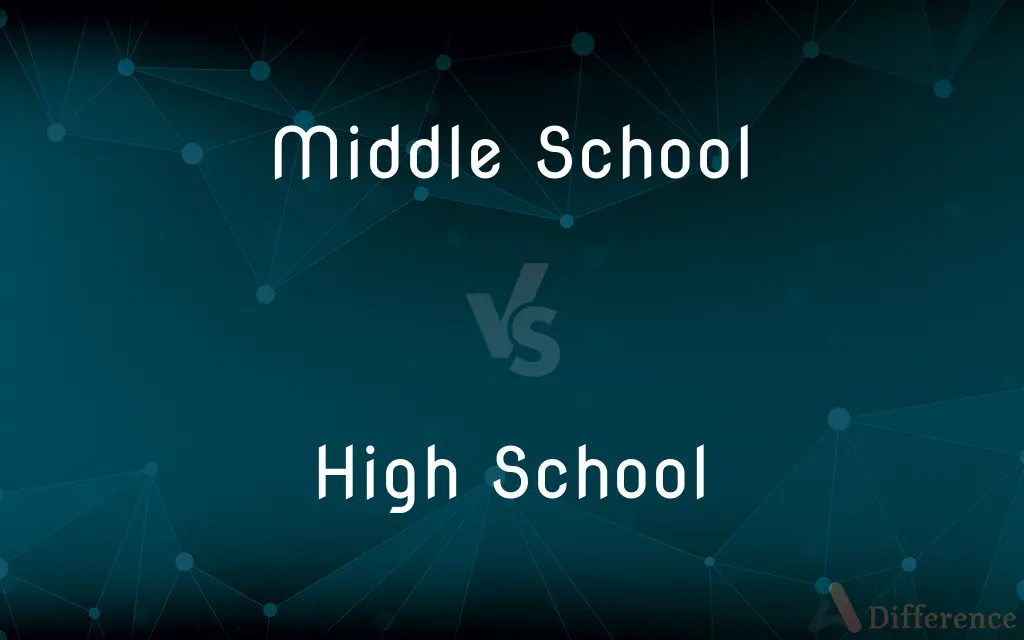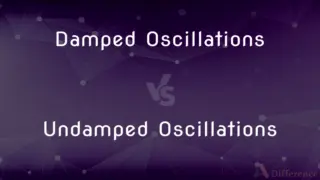Middle School vs. High School — What's the Difference?
By Tayyaba Rehman — Published on December 24, 2023
Middle School typically covers grades 6-8 for ages 11-14, while High School covers grades 9-12 for ages 14-18, marking transitions in academic and personal development.

Difference Between Middle School and High School
Table of Contents
ADVERTISEMENT
Key Differences
Middle School and High School are distinct phases in the U.S. educational system. Middle School often serves as a bridge between elementary and high school, focusing on grades 6-8. In contrast, High School offers grades 9-12 and prepares students for college or careers.
From a developmental perspective, Middle School caters to early adolescence, a period of rapid physical, emotional, and social changes. High School, on the other hand, guides students through late adolescence, where they mature into young adults and make future-oriented decisions.
In terms of curriculum, Middle School provides foundational subjects and introduces students to more specialized topics. High School dives deeper, offering advanced courses and various electives, allowing students to explore potential career paths or academic interests.
Socially, Middle School is a time of self-discovery and forming peer relationships. High School is marked by more significant events such as proms, sports competitions, and graduation, reflecting a more mature social landscape.
Finally, while Middle School focuses on helping students adapt from the elementary school format, High School emphasizes preparing students for the world beyond, whether that's college, vocational training, or the workforce.
ADVERTISEMENT
Comparison Chart
Grades Covered
Typically 6-8
Typically 9-12
Age Range
Approximately 11-14
Approximately 14-18
Developmental Focus
Early adolescence
Late adolescence
Curriculum
Foundational subjects, introductory specialized topics
Deeper subjects, advanced courses, electives
Social Milestones
Self-discovery, forming peer relationships
Prom, sports, graduation, mature relationships
Compare with Definitions
Middle School
Grades 6-8 in the U.S. education system.
He won the Middle School science fair with his innovative project.
High School
A period of maturation and future-oriented decision-making.
She began considering medical school while in High School.
Middle School
Transitional schooling emphasizing foundational learning.
The Middle School curriculum introduced him to various literary genres.
High School
Comprising grades 9-12 in the U.S.
He played football throughout his High School years.
Middle School
An educational stage between elementary and high school.
She began playing the violin in Middle School.
High School
Offering advanced academic and elective courses.
He took Advanced Placement courses in High School.
Middle School
A period of early adolescence and self-exploration.
Her love for art was ignited during her Middle School years.
High School
The final educational phase before college or work.
She was the valedictorian of her High School graduating class.
Middle School
An environment fostering social and academic growth.
He made his lifelong friends during Middle School.
High School
An environment of significant social events and milestones.
Prom night was one of her most memorable High School experiences.
Middle School
A school at a level between elementary and high school, typically including grades five or six through eight.
High School
A secondary school that usually includes grades 9 or 10 through 12.
Common Curiosities
Is Middle School mandatory?
In most states, education until age 16 is mandatory, which includes Middle School years.
Is the SAT or ACT typically taken in High School?
Yes, students often take these exams in their junior or senior years of High School.
Can students specialize in a subject in Middle School?
While there's some subject exploration, true specialization typically starts in High School.
Can students earn college credits in High School?
Yes, through AP exams or dual enrollment programs.
How long does High School usually last?
High School typically lasts four years.
What's the main goal of Middle School education?
To bridge the gap between elementary education and High School, both academically and socially.
At what age do students typically start Middle School?
Usually, around 11 years old.
Are college preparatory courses available in High School?
Yes, many High Schools offer Advanced Placement (AP) or other college-prep courses.
Are extracurricular activities common in Middle School?
Yes, many Middle Schools offer clubs and sports to students.
Is there a significant social difference between Middle School and High School?
Yes, with High School social dynamics being more mature and influenced by future-oriented decisions.
Are sports more competitive in High School than Middle School?
Generally, yes, with many High School athletes aiming for college scholarships.
Do Middle Schools have graduation ceremonies?
Some do, often called "promotion ceremonies," but they're usually less formal than High School graduations.
What is the significance of the GPA in High School?
It's used for college admissions and can reflect a student's academic performance.
Do Middle School grades affect college admissions?
Typically, colleges focus on High School grades, but strong Middle School performance can set a good foundation.
How do High School curricula vary from Middle School?
High School offers more advanced courses, deeper subject matter, and a wider range of electives.
Share Your Discovery

Previous Comparison
Damped Oscillations vs. Undamped Oscillations
Next Comparison
Unsaturated Solutions vs. Saturated SolutionsAuthor Spotlight
Written by
Tayyaba RehmanTayyaba Rehman is a distinguished writer, currently serving as a primary contributor to askdifference.com. As a researcher in semantics and etymology, Tayyaba's passion for the complexity of languages and their distinctions has found a perfect home on the platform. Tayyaba delves into the intricacies of language, distinguishing between commonly confused words and phrases, thereby providing clarity for readers worldwide.
















































